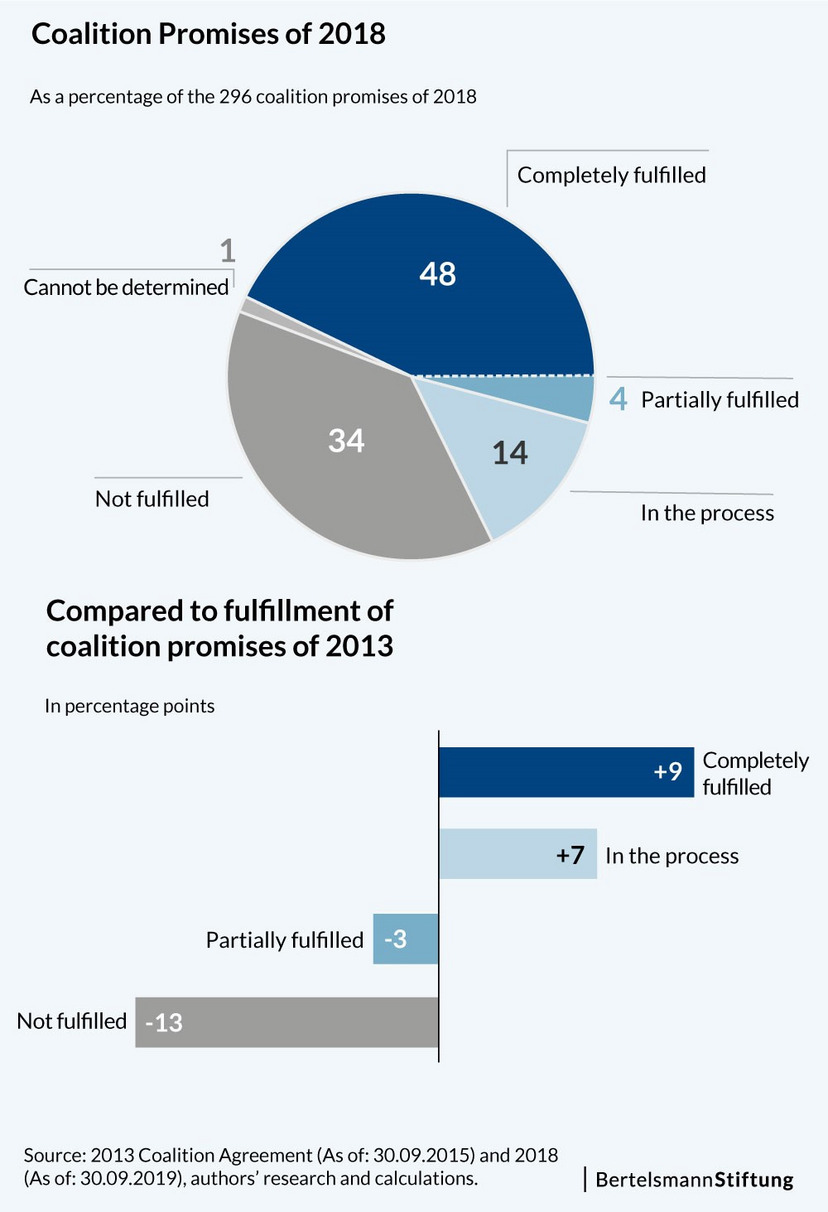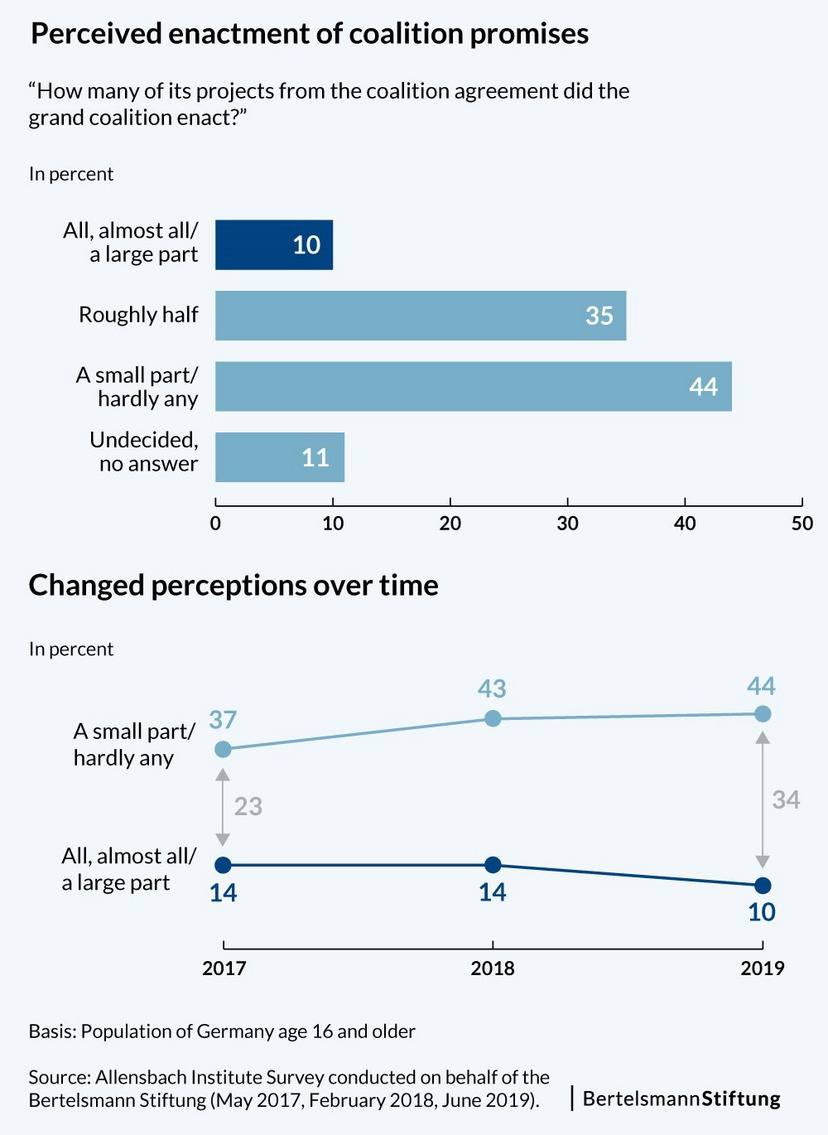To date, the "GroKo" – as Germany's grand coalition government is called – has kept most of its promises. After almost two years of governing, it has already fully or partially enacted or at least substantially started on two-thirds of the promises it made in the coalition agreement. This is significantly more than the previous government had achieved at the midterm of its four-year legislative period (53 percent).

© pitsch22; picoStudio - stock.adobe.com
Better than its reputation? The "GroKo" fulfills its promises – and fast
It's halftime in Berlin: In the fall, Germany's federal government will present an interim report regarding the promises it made in the coalition agreement. A recent Bertelsmann Stiftung study already shows the following: In the first 18 months of its government activity, Germany's grand coalition – or "GroKo,"– has already fulfilled or started on two-thirds of its promises. But voters don't see it.
But even this success does little for the federal government in the eyes of voters. Only one in 10 people in Germany believes that at least "a large part" of the promises in the coalition agreement are actually being kept. In contrast, more than two-thirds (79 percent) believe that "hardly any" or "roughly half" of such projects are being realized.
These are the results of a study jointly conducted by the Bertelsmann Stiftung and the Berlin Social Science Center (WZB), which analyzed the current coalition agreement and examined the fulfillment rate of the projects anchored in it (reference date: September 30, 2019). In addition, the study is based on a representative public opinion survey focused on assessments of the government's promise-keeping performance.
For its analysis, the research team identified 296 "real promises" in the coalition agreement. That is 108 more individual promises than in the coalition agreement of the previous grand coalition, which governed from 2013 to 2017. Only projects that can be empirically verified on the basis of clear fulfilment criteria were classified as "real promises."
"If the grand coalition continues to work at its current pace, it could keep almost all of its 296 promises by the end of the legislative period,"
Robert Vehrkamp, a Bertelsmann Stiftung expert on democracy
"The study's results point to a record-breaking midterm balance for the current grand coalition." explains Robert Vehrkamp, expert on democracy at the Bertelsmann Stiftung and co-author of the study.
Balanced Enactment Rates of the Coalition Partners
A breakdown according to the election platforms of the coalition partners shows that more projects came from that of the Social Democratic Party (SPD). Roughly 25 percent (73 out of 296) of all promises in the coalition agreement were exclusively found in the Social Democrats' election platform, whereas 11 percent (32 out of 296) were only in the joint election platform of the Christian Democratic Union (CDU) and its Bavarian sister party, the Christian Social Union (CSU). 46 projects were included in both platforms. "This indicates that the SPD was somewhat more successful than the CDU/CSU during the coalition negotiations in terms of anchoring topics from its own election platform in the ultimate coalition agreement," Theres Matthieß, co-author of the study says. Conversely, the track records of the coalition partners in terms of enacting promises have so far been more balanced. To date, 53 percent of the CDU/CSU-only promises and 51 percent of the SPD-only promises have been enacted. Looking at the performances of the individual ministries (and one minister of state), one sees that the Ministry of the Interior is responsible for the largest single share of individual promises in the coalition agreement (49). Having already completely fulfilled 29 of these promises, this same ministry also has the best enactment rate to date in terms of absolute figures. On the other hand, standing far ahead of the pack in terms of efficiency is the Ministry of Defense, which has already completely achieved 10 of the 13 goals (77 percent) set out for it in the coalition agreement.
Faulty Assessments Risk Increasing Political Disenchantment
Regarding popular opinions, the survey shows that most people in Germany (89 percent) believe that it is "important" or even "very important" for governments to keep their promises. At the same time, however, fewer and fewer people are aware of just how many of these promises are actually being kept. For example, even the share of supporters of the governing CDU/CSU and SPD who say that the government usually enacts "all, almost all" or at least "a large part" of its promises stands at only about 20 percent. This perception gap is even greater among sup-porters of the right-wing populist Alternative for Germany (AfD) party, as only five in 100 of them believe that at least a large share of government promises are kept, while more than half (55 percent) say that "hardly any" or only "a small part" are kept.
"Fair Play" and Focus to Improve the Situation
To resolve this dilemma, the study's authors recommend that political actors pursue more voter-oriented government action and communication and that there be more fair play in the public discourse regarding campaign and government promises. In their opinion, politicians need to become better listeners and to then explain in a more focused manner how and why they are pursuing or achieving certain goals. At the same time, the public should also recognize and acknowledge when promises have been fulfilled. "In a democracy, reliable governmental action is a precious asset and a value in its own right, even if it doesn't always correspond to one's own opinion," Vehrkamp notes.
The "Policy Brief" presented here is an updated version of the study: "Besser als ihr Ruf: Halbzeitbilanz der Großen Koalition zur Umsetzung des Koalitionsvertrages 2018". For the updated version, a investigation period from 7 February 2018 to 30 September 2019 applies. For the study publication, results up to 30 June 2019 were taken into account.





